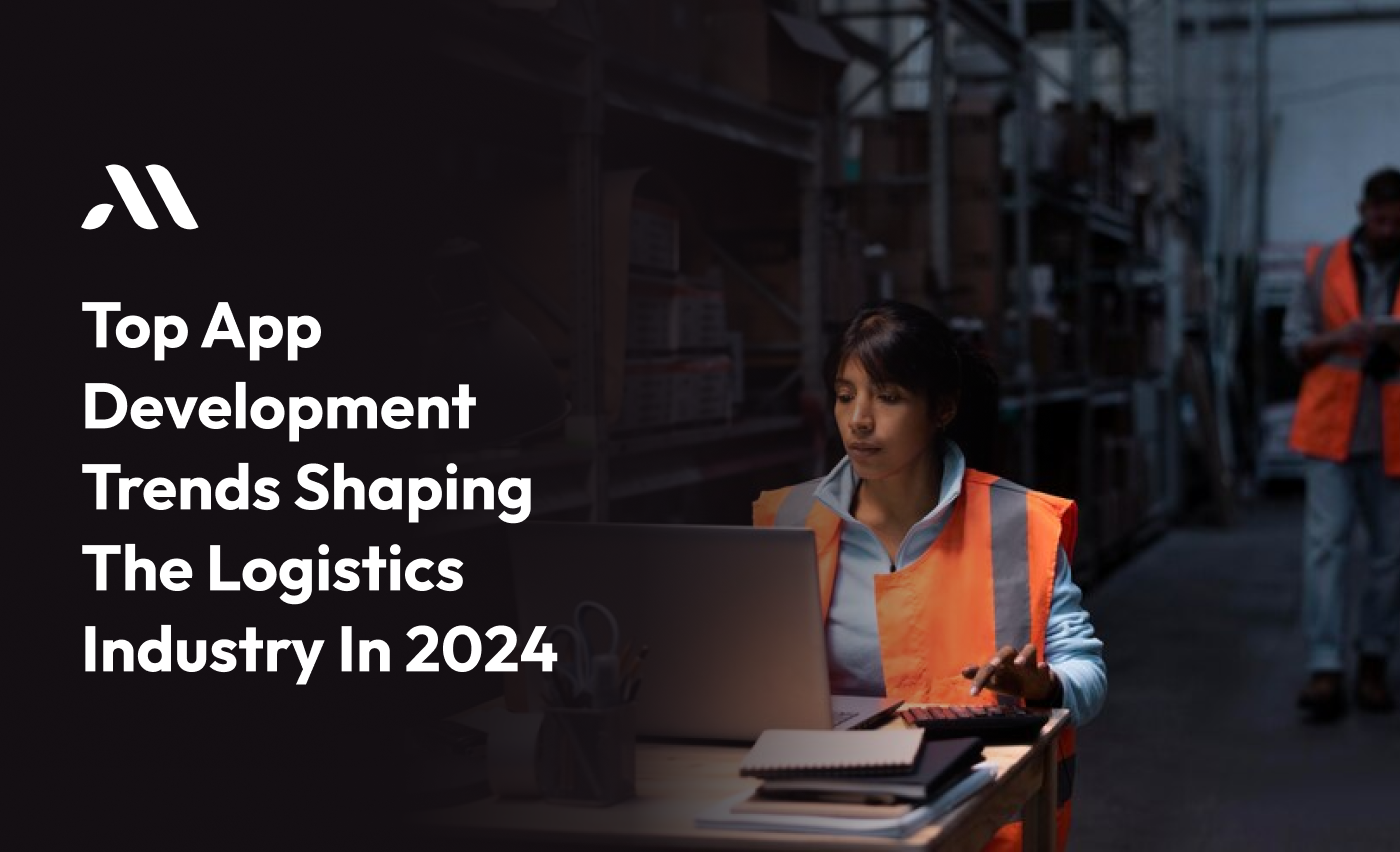Introduction
In the fast-paced world of logistics, staying ahead of the curve is important. The logistics industry constantly evolves, with businesses seeking innovative ways to streamline operations, improve efficiency, and reduce costs. In 2024, app development trends are one of the biggest drivers of this change. Apps play a crucial role in shaping logistics companies' operations, and if you want to keep your business on top, understanding these trends is key.
Whether you're a business owner or part of the management team in the logistics industry, knowing the latest app development trends will help you make informed decisions. These trends aren't just about making apps; they’re about reshaping how the entire logistics chain works.
In this article, we’ll walk you through the top app development trends that are shaping the logistics industry in 2024. Plus, we’ll discuss the importance of custom app development and why partnering with a custom app development company is the best step forward.
App Development Trends For the Logistics Industry in 2024
1. Artificial Intelligence (AI) and Machine Learning (ML) in Apps
One of the most prominent app development trends in the logistics industry is the integration of Artificial Intelligence (AI) and Machine Learning (ML). These technologies are revolutionizing how companies predict demand, optimize routes, and manage inventory.
AI-powered apps can analyze large amounts of data to provide insights that human analysis simply can’t match. For example, AI apps can predict potential delays, suggest alternative routes, and even forecast future demand based on historical data. This is extremely useful for logistics companies, where timing and efficiency are critical.
By 2024, AI-driven supply chain optimization is expected to increase efficiency by 45%, leading to cost reductions of up to 30%.
2. Internet of Things (IoT) for Real-Time Tracking
The Internet of Things (IoT) is another significant app development trend. IoT refers to connecting physical devices to the internet, allowing them to communicate with each other and share data in real time.
For the logistics industry, IoT-enabled apps are game-changers. These apps allow logistics companies to track shipments, vehicles, and even individual items in real time. This transparency helps prevent lost goods, ensures timely deliveries, and increases overall customer satisfaction.
For example, an IoT-enabled app can provide real-time updates on a delivery truck’s location and send notifications if there’s an unexpected delay.
Tip: To stay competitive, ensure your business incorporates IoT-based apps for tracking and management.
3. Blockchain for Transparency and Security
Blockchain technology is no longer limited to the finance world; it's becoming an essential part of the logistics industry as well. One of the most important app development trends in logistics is using blockchain for secure, transparent transactions.
Blockchain-based apps can securely record every step of a product’s journey, from production to delivery, ensuring complete transparency. This is particularly useful for logistics companies handling sensitive or high-value goods. It ensures that all transactions are secure and verifiable, reducing the risk of fraud.
In addition, blockchain apps also improve trust between all parties involved, as they can easily verify the authenticity of documents, payments, and goods.
Note: According to a recent study, 60% of logistics companies are considering blockchain apps to enhance their supply chain security by 2025.
4. Cloud-Based Apps for Scalability
Cloud computing has emerged as one of the top app development trends because of its ability to provide scalability, flexibility, and cost-efficiency to logistics businesses. With cloud-based apps, logistics companies can access data from anywhere, enabling better decision-making and improved collaboration.
One of the primary benefits of cloud apps is scalability. As logistics companies grow, their data needs also increase. Cloud apps help companies to easily scale their operations without investing in expensive hardware or IT infrastructure.
For example, a cloud-based logistics app can track inventory across multiple warehouses in real time, providing accurate stock levels to all stakeholders at any time.
5. Custom App Development for Customize Solutions
While off-the-shelf apps can be useful, they usually don’t cater to the specific needs of your logistics business. That’s why custom app development is one of the most popular app development trends in the logistics industry today.
Custom app development involves creating an app specifically tailored to your business needs. Whether you need an app to track multiple delivery fleets, manage warehouse inventory, or provide real-time analytics, a custom app development company can build it for you.
Custom apps also offer the advantage of integration. Many logistics companies use several systems for various tasks (e.g., transportation management, inventory tracking, etc.). A custom-built app can integrate all these systems into a single platform, simplifying operations.
Tip: If your business has unique logistics challenges, consider investing in custom app development. A custom app development company will work closely with you to understand your requirements and build an app that fits your needs.
6. Mobile Apps for Fleet Management
Mobile apps have become indispensable in the logistics industry, especially for fleet management. One of the key app development trends is creating mobile apps that help logistics companies monitor and manage their vehicle fleets.
Mobile fleet management apps allow business owners to track their vehicles, schedule maintenance, and even monitor driver behaviour. These apps help reduce fuel costs, ensure compliance with regulations, and keep fleets running smoothly.
For example, an app can alert fleet managers when a vehicle is due for maintenance, preventing costly breakdowns and ensuring smoother operations.
7. On-Demand Delivery Apps
In 2024, on-demand delivery services are booming, and one of the biggest app development trends is the rise of on-demand delivery apps. These apps connect customers directly to drivers or couriers, allowing for fast, efficient, and flexible delivery options.
On-demand delivery apps are not just for big businesses; smaller logistics companies can also benefit from custom app development to build their on-demand delivery platforms. These apps help companies offer faster delivery options, providing a competitive edge in an increasingly demanding market.
The global on-demand delivery market is expected to reach $465 billion by 2027, with mobile apps playing a significant role in its growth.
Also Read - Best SaaS Tools for Warehouse Management Systems
8. Big Data Analytics in Logistics Apps
Big Data is another key app development trend in logistics. Logistics companies handle enormous amounts of data daily, from tracking shipments to managing inventories. Big Data analytics apps allow logistics companies to process this data and gain valuable insights.
Big Data apps can forecast trends, optimize routes, and even predict when vehicles will need maintenance, leading to more efficient operations. By analyzing past data, these apps help logistics companies make better decisions, reduce costs, and improve delivery times.
Tip: Using Big Data apps can help your logistics business become more proactive, allowing you to anticipate challenges and solve them before they arise.
Conclusion
The logistics industry is undergoing significant transformation, and at the heart of this change are the latest app development trends. From AI and IoT to blockchain and Big Data, these trends are shaping how logistics companies operate in 2024.
For business owners, understanding these trends is crucial. Investing in the right technologies, such as custom app development, can set your business apart from competitors. Working with a custom app development company allows you to tailor solutions to meet your specific needs, ensuring that your operations run smoothly and efficiently.
Remember: Keeping up with the latest app development trends in logistics isn’t just about staying current; it’s about staying ahead. By accepting these technologies, you’ll be better equipped to meet customer demands, reduce costs, and streamline your operations. Make 2024 the year your logistics business grows with the power of technology.
Looking to improve your logistics business with custom apps? MicraSol is here to help! We create easy-to-use, custom-built apps designed to meet your specific needs. From real-time tracking to fleet management, our solutions make your operations run smoother. Let’s take your business to the next level with smart technology!
FAQS
Why should logistics businesses care about app development trends?
App development trends are important because they help logistics businesses improve operations, reduce costs, and deliver better services to customers. By using the latest technologies like AI, IoT, and custom apps, logistics companies can stay competitive and meet customer demands more efficiently.
What is custom app development, and why is it important for logistics companies?
Custom app development means creating an app specifically for your business needs. For logistics companies, it’s important because every business is different, and a custom app can help with tasks like tracking deliveries, managing inventories, or handling fleets in ways that fit your specific operations.
How can Artificial Intelligence (AI) help my logistics business?
AI can help logistics businesses by predicting things like delivery delays or inventory shortages. It can also suggest better routes for drivers and help with demand forecasting. This leads to faster deliveries, lower costs, and more efficient operations.
What is the Internet of Things (IoT), and how does it improve logistics?
The Internet of Things (IoT) connects physical devices, like trucks and shipments, to the internet, allowing them to share data in real-time. This helps logistics companies track shipments, monitor vehicle performance, and ensure deliveries are on time, improving transparency and efficiency.
What benefits does blockchain technology offer in logistics apps?
Blockchain provides security and transparency in logistics operations. It keeps a record of every transaction and movement in the supply chain, making it easier to verify documents and track goods. This reduces the chances of fraud and builds trust among all parties involved.








